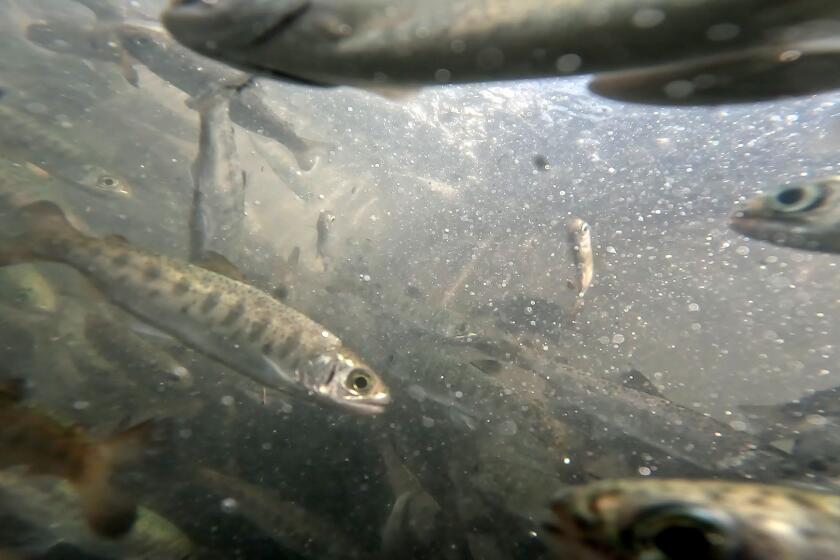Hunt Is on for Island’s Troublesome Tenants
The chain of events that brought Norm MacDonald, his helicopter, his rifle and his dogs from New Zealand to Santa Cruz Island began with the pig.
Well, DDT and the pig.
MacDonald is the owner of Prohunt, a New Zealand company hired to kill the several thousand feral pigs that endanger native plants and at least one native animal in the Channel Islands off Ventura.
Beginning this week, MacDonald and his team of 10 hunters will spend 27 months shooting pigs until not one remains on Santa Cruz Island.
They’ll use traps, gunners from helicopters and tracking dogs in relentless porcine pursuit.
The 96-square-mile Santa Cruz Island, 18 miles off the Ventura County coast, is one of the most ecologically rich and complex areas left in California. It is owned by the nonprofit Nature Conservancy and the federal National Parks Service.
The history of its degradation, however, is as rich and complex as the island itself.
From 1947 to 1971, DDT manufacturer Montrose Co. dumped large quantities of the chemical into the channel.
That weakened the eggs of the bald eagle, which nested in the Channel Islands, resulting in its disappearance from the chain.
Meanwhile, pigs were being raised on the ranches on the island from about the mid-1800s to the 1980s. Pigs that got loose became wild -- and began reproducing.
The sins of the pigs are many.
They root through island vegetation, causing erosion and providing fertile ground for nonnative plants, such as fennel. Fennel has spread uncontrollably, in thick pastures smelling of black licorice, and now endangers nine species of native plants.
Pigs eat acorns, preventing the native oak trees from reproducing.
The pigs, moreover, dig up ancient Chumash Indian settlements and gravesites.
And the young pigs are prey for nonnative golden eagles, which found the pickings especially good on Santa Cruz Island. Well-fed and aggressive, golden eagles forced out the bald eagles.
The golden eagles came for the piglets, but they stayed for the island fox, an animal found nowhere in the world but the islands off Southern California. And because of the golden eagles, the island fox hovers near extinction. Last year, the animal, roughly the size of a small cat, was placed on the federal Endangered Species List.
Fixing the man-made chain of events has required a complicated series of ecological surgeries, according to environmentalists and National Parks Service officials.
And the last of these -- eradicating the feral pigs -- began this week with MacDonald’s hunt.
Island foxes, meanwhile, are being bred and readied for release in the wild once the pigs meet their fate. The numbers of golden eagles have already been reduced, and bald eagles were reintroduced a few years ago.
The restoration costs -- totaling $5 million -- have come from proceeds from a lawsuit against the Montrose Co. that was settled in 2000.
“Introducing DDT in the 1960s, who would have known” the consequences 40 years later? said David Garcelon of the Institute for Wildlife Studies, a nonprofit organization working on the island. “Humans messed it up. We got [the pigs] out here,” he said. “It’s a whole lot easier to cause the problem than to fix the problem.”
Still, MacDonald foresees few hurdles in dispatching the entire pig population in the allotted 27 months.
Along with their many sins, feral pigs have a good many weaknesses, he said. One of them being that they “don’t take any notice that we’re flying over,” MacDonald said. “Then they tend to run in straight lines and they won’t stay in the bush. They seem to trap easy and they have the herd instinct.”
But the pigs are not without friends.
Outside the National Park Service building at Ventura Harbor on Friday, Scarlet Newton called the pig hunt “cruel, wasteful, dangerous and unjust.”
As she spoke, a plane flew over pulling a sign reading, “Save the Pigs.” The flight was paid for by Newton’s group, the Channel Islands Animal Protection Assn., which is lobbying to stop the pig hunt. The organization advocates pig contraception and sterilization as ways of eradicating the population.
But those measures won’t eliminate the pigs, and California won’t allow them on the mainland for fear of the diseases they carry, said Russell Galipeau, Channel Islands National Park superintendent.
“The decisions aren’t easy,” he said. “But do I want to be the manager who said it’s OK for the island fox to go extinct, it’s OK to lose endangered plants? No.”
MacDonald agrees with that assessment of the bottom line.
“The science on it is good. It’s been well-studied,” he said. “At least I can tell my kids, when we’ve finished this project, that the fox has been saved.”



